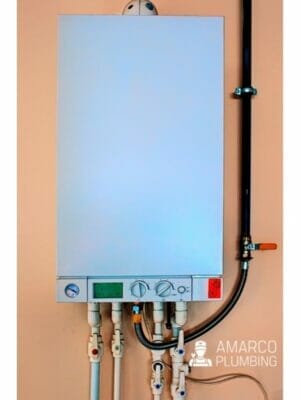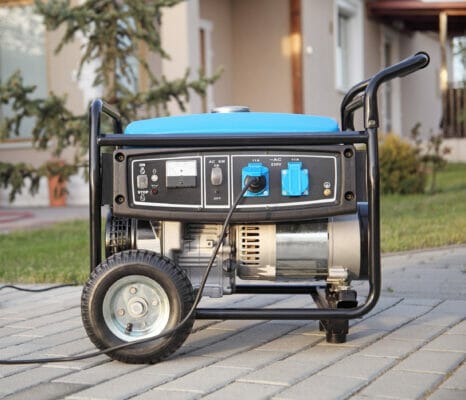Disclaimer: This post may contain affiliate links, meaning we get a small commission if you make a purchase through our links, at no cost to you. For more information, please visit our Disclaimer Page.
On average, a water heater uses about 4000 Watts if it runs between four to five hours per day. This also depends stuff such as the type of water heater, size of it and the age.
Table of Contents
What Determines Electricity Used By A Water Heater?
Water heaters are an essential part of any home as they produce hot water for cooking, bathing, and cleaning. This usage means that you will run your water heater for a certain number of hours in a day. This usage will affect the amount of electricity your water heater will consume.
The size of your water heater also determines the amount of electricity consumed. The more gallons the water heater hold, the more electricity it will use. The tank size also determines the water heater’s energy factor rating.
The energy factor rating measures how much hot water your water heater will produce per unit quantity.
Your water heater’s age will also affect the amount of electricity used. The older the water heater, the more energy it takes to keep the heating system running, hence more electricity spent.
Do All Water Heaters Use The Same Amount Of Energy?
All water heaters do not use the same amount of energy. Smaller water heaters are more efficient than their larger counterparts.
Tank and tankless water heaters also have different levels of energy. Tank water heaters have stand-by heat loss, meaning water cools down when the heater is not in use. You will need to power up the heater again when this happens. The amount of energy used will increase.
Tankless water heaters do not have this reserve water. Tankless water heaters operate on demand, and you will save a lot of energy during the day.
Gas-powered water heaters are more efficient than those that run on electricity. In terms of expenditure, you will spend less on your gas bills as the cost is lower than electricity.
The amount of gas you use on your gas water heater depends on the size of your home and the number of people who use hot water.
On average, a propane gas water heater will use 1.5 gallons of propane gas in a day.
How Can I Minimize Water Heater Electricity Usage?
Electric water heaters should not be the reason your electric bills spike now and then.
To minimize electricity usage, reduce the thermostat readings on your water heater. Overheating your water means that you are using more power to generate excess heat.
Reduce the amount of time spent in the shower. The longer you stay, the longer the water heats, and the more electricity will be used. Also, insulate your tank so that it retains more heat.

Can I power My Water Heater With A Generator?
You can power your water heater with a generator. The generator’s rating, however, has to match your water heater’s. This rating is the amount of power that your generator will produce at a given time.
If your generator’s rating is more than your water heater’s, it could overwhelm your water heater and cause power surges that may damage it. You also need a generator that complies with your water heater’s wattage.
3 types of water heaters can run on generators. These are:
The conventional electric tank water heater is the most common and relies purely on electricity. In case of a power outage, it will not power up, so you will need a generator. It will, however, provide you with some hot water from its reserve in the water tank.
Tankless water heaters use an on-demand model, whereby the heater is only switched on when required. It also solely relies on electricity and will not work during a power outage. Unfortunately, this type of water heater does not have reserve water to fall back on, so a generator will be handy to get it up and running.
Gas tank/tankless water heaters use natural gases to heat your water. They require minimal amounts of electricity to power up elements like the pilot light. These water heaters will not rely so much on generators, but it would be good to keep one on stand-by for the sake of the pilot light.
As seen above, the type of water heater you have will dictate how you use your generator. A conventional electric tank water heater for example can use up to 4000 Watts, while a gas tankless heater may use up 100 Watts.
When you consider powering your heater with your generator, check if your water heater has a power cord and available power outlets. If your water heater is hard-wired, as most water heaters are, call your plumber or electrician before proceeding to connect it to the generator.
The type of generator matters as well when you think about powering your water heater. Permanent generators produce up to 10,000 Watts. Portable or camping generators produce at most 5000 Watts.
Powering your water heater with a portable generator will be challenging as it may not work to maximum efficiency. The downside of heavy-duty permanent generators is that they are expensive.
Powering your water heater with a generator means that there could be an electrical problem in your home or building. If this is the case, it is safe to assume that other appliances such as your fridge or electric cooker will need generator power too.
You can use a generator to power your water heater if it is the only appliance you intend to connect. If you want to plug in other machines, ensure your generator is powerful enough.
What Size Generator Do I Need To Run A Hot Water Heater?
Your generator needs to produce more power than your water heater. That means if your heater uses 5 kilowatts of power, your generator should produce 6 kilowatts. You also need a mega generator if you have a lot of electrical appliances in the house for convenience.
To know what size of generator you need, calculate the wattage of all your household appliances, including your water heater.
Your generator has to exceed this. It will even be more helpful if you have a hard-wired water heater that might not run on a standard or portable generator but run on a bigger house generator.
Since this generator is expensive, you can get a generator that fits your budget, but only (or preferably) use it for your water heater. If need be, plug in a much smaller device simultaneously, such as a microwave.
If you must plug in multiple devices, switch on one device at a time.
As you plan to use your generator to power your water heater, think of the gas cost implications. Depending on household usage, a 12000 Watt generator can consume more than 25 gallons of gas a day. The more powerful the generator, the more gas you will need to keep it running.
If you plan to connect your water heater to a house generator that might run throughout the day and night, or while there is a power outage, you will not be able to consume the fuel used.
However, if you are cost-conscious and want to save energy, you can only plug in your water heater to the generator and switch it on only when needed.
